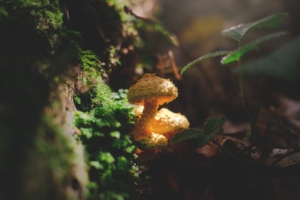
From space operas like Star Wars to epic fantasies like Game of Thrones, a cornucopia of cultural touchstones can be traced back to Frank Herbert’s classic 1965 sci-fi novel Dune, the bestselling book director Denis Villeneuve’s new blockbuster movie is based on.
Renowned for thematic complexity, political chicanery, and rich world building, it’s worth exploring what inspired Herbert’s seminal work. Would you believe us if we said psychedelics?
It’s true. From Herbert’s personal affinity for psilocybin to the entire plot revolving around a psychoactive drug, the evidence is clear: mushroom magic brought Dune to life.
Frank Was a Major Mushroom Fan
Herbert was nearly 40 years old when he started working on Dune in 1959. He’d studied ecology for years with areas of expertise ranging from sand dunes in Oregon to mushroom farming.
According to renowned mycologist Paul Stamets, the Fantastic Fungi star who wrote about crossing paths with Herbert in the ‘80s, the sci-fi author was also an “avid mushroom collector” who experimented with psilocybin and developed his own method of growing fungus.
“[Herbert] would put a few weathered chanterelles in a 5-gallon bucket of water, add some salt, and then, after 1 or 2 clavs, pour this spore-mass slurry on the ground at the base of newly planted firs. When he told me chanterelles were glowing from trees not even 10 years old, I couldn’t believe it,” Stamets wrote in Mycelium Running: How Mushrooms Can Help Save the World.
“Frank went on to tell me that much of the premise of Dune … came from his perception of the fungal life cycle, and his imagination was stimulated through his experiences with the use of magic mushrooms,” Stamets continued.
‘Spice’ Gives the Protagonist a New Perspective on Life

Herbert’s book describes a civilization obsessed with a mind-altering, brain-enhancing, consciousness-expanding psychoactive substance. The drug is called melange, or “spice,” and it’s the galaxy’s most valuable resource because it fuels interstellar travel.
Dune’s primary storyline follows young messiah-in-the-making Paul Atreides (played in the new film by Timothée Chalamet), whose father has just been given the keys to the uninviting desert kingdom of Arrakis, a planet on which water is scarce but spice is abundant. Soon after landing on Arrakis, Paul realizes there’s more to spice than he’s been told.
First, he has visions of Chani (Zendaya), a young woman with vibrant blue eyes who belongs to a group of desert people called the Fremen. Later, after inhaling spice for the first time, Paul’s mind undergoes a dramatic transformation. He’s disoriented at first but eventually comes to see the world more clearly than ever before, putting him on the path to become a thoughtful, charismatic leader. He can even look into the future.
While there’s no evidence real-life psychedelics turn people into psychics, the idea of spice boosting intelligence isn’t far off from the Stoned Ape Theory which posits humankind’s brain evolved after early man used magic mushrooms. Likewise, hallucinogens have helped people expand their consciousness, connect to their environment, and even evolve as leaders.
“[I’m] looking at how we can leverage psychedelic experiences to help us become more heart-centered leaders who are really focused on contributing to the betterment and awakening of humanity,” microdosing mentor Laura Dawn recently told the Psychedelic Spotlight Podcast. “I feel like it’s taught me what it means to be a visionary.”
Like Sacred Medicine, Spice Means Different Things to Different Cultures

Near the beginning of Dune, Paul gets a valuable lesson in perspective.
“For the Fremen, spice is the sacred hallucinogen which preserves life and brings enormous health benefits. For the Imperium, spice is used by the navigators of the Spacing Guild to find safe paths between the stars. Without Spice, interstellar travel is impossible making it by far the most valuable substance in the universe,” he’s told.
In this case, the parallel between the spice of Arrakis—which imperial forces steal from the sand and sell for profit—and real-life plant medicines like ayahuasca—which Westerners have been accused of appropriating for their own ends—could hardly be more obvious.
Thankfully, Paul eventually comes to see the spice as far more than just a tool to facilitate space travel which should be collected by any means necessary and sold to the highest bidder. The spice is in fact a sacred offering of the desert which provides spiritual enlightenment as well as physical and mental benefits, and it should be honored as such.
During his recent conversation with the Psychedelic Spotlight Podcast, ethnobotanist and activist Joseph Mays said he’s hoping to open psychedelics users eyes in a similar fashion to help the Indigenous people who introduced sacred plant medicine to the world. “There’s a huge amount of wealth that will be going in one direction and [my program] is trying to rebalance that and funnel some of that into indigenous communities whenever possible,” he said.
Respect and Sustainability for Indigenous Peoples

Frequently cited as the first ecological-themed science-fiction novel, one of Dune’s primary antagonists is the exploitative nature of civilization itself. The story is set 8,000 years in the future when humankind has explored the galaxy and propagated its species across thousands of planets. Yet, for all its advancements, civilization is unable (or unwilling) to live in concert with nature. The ecological imbalance is most evident on the planet Arrakis, a.k.a Dune, controlled by Imperium agents concerned only with extracting as much spice as they can.
Halfway through the new film, Paul learns the family which ruled the planet before his had passed on an opportunity to restore balance to Arrakis, to bring water to the planet and make it more habitable for the sun-hardened Fremen. Doing so would’ve threatened the spice production, however, which was a risk the profit-worshipping Harkonnens weren’t willing to take.
As Paul embraces his destiny as Arrakis’s new would-be leader, he vows to make some significant changes. “As emperor … I could make a paradise of Arakkis with the wave of my hand,” Chalamet’s character tells Dr. Liet-Kynes (Sharon Duncan-Brewster), the planet’s chief ecologist, essentially promising to end the planet-wide drought and prioritize Fremen lives, culture, customs, and sacred medicine over financial interests. Paul doesn’t want to end Spice production, of course; he wants to devise an equitable and sustainable method for the Fremen to share Spice with the universe.
In creating a hero who fights to establish reciprocity, Herbert was perhaps several decades ahead of his time.
During his interview with the Psychedelic Spotlight Podcast, Mays, who directs the Indigenous Reciprocity Initiative of the Americas, also spoke of a real-life initiative to encourage psychedelic enthusiasts here on Earth to help preserve the lands, cultures, food supply, and sacred medicines of Indigneous groups all across the continent.
“Indigenous people make up less than 15 percent of the global population but they occupy more than half of the land mass, and that land mass is all of the most biodiverse regions of the planet. Really, they’re on the front lines of the fight against climate change, against environmental degradation, against exploitation and pollution, so it’s important to listen to what they have to say,” Mays explained.
Dune: Part II Will Be a More Intense Psychedelic Trip
Unlike Paul Atreides, we don’t have the gift of precognition. However, if Dune: Part II is as faithful to the novel as Villeneuve’s first installment, viewers are likely in store for even more doses of spice the next time around.
It would be rude to give away too many plot details, but expect Paul to do more than just dabble in spice as he comes to rely on the psychoactive substance and the powers of precognition it grants him. Likewise, his mother Lady Jessica (Rebecca Ferguson) will finally get in on the action, too, by drinking a trajectory-altering cocktail called the Water of Life. Like it’s spice-y cousin, the mysterious blue narcotic originates from the sandworms of Arrakis and bestows psychedelic visions upon those who ingest it.





